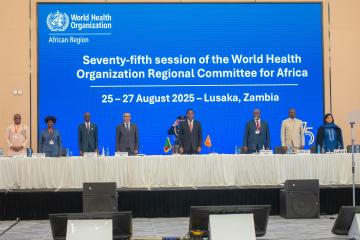Lusaka — African ministers of health and global partners gathering for the Seventy-fifth session of the World Health Organization (WHO) Regional Committee for Africa today pledged stronger action to accelerate local manufacturing of medicines and medical products to ensure self-sufficiency.
Africa currently produces less than 1% of the vaccines it consumes, leaving the region vulnerable to supply chain disruptions and global inequities. The health leaders committed to increase domestic investment, expand clinical trial capacity and implement the Regional Framework for Strengthening Local Production of Medicines, Vaccines, and Other Health Technologies (2025–2035).
“The issue of local manufacturing must be high on Africa’s agenda,” said H.E Hakainde Hichilema, President of the Republic of Zambia at the opening of the Regional Committee. “Zambia will take the lead in local products manufacturing, and we hope other countries can join to improve the well-being of people across the region.”
While progress has been made in pandemic preparedness, the region continues to face challenges in securing stronger partnerships, sustainable financing, and enabling policy support for local production of medicines.
The initiative to boost local manufacturing is supported by partners including Unitaid, the International Vaccine Institute (IVI), and Gavi, the Vaccine Alliance, who gathered for a high-level side-event on local manufacturing of medicines, vaccines and other health technologies on the sidelines of the regional committee meeting.
“The COVID-19 pandemic laid bare the continent’s vulnerabilities: insufficient access to vaccines, fragile supply chains and overdependence on external markets. But it also ignited new resolve. For Africa to produce 60% of its own vaccines by 2040, said Dr Mohamed Janabi, WHO Regional Director for Africa. “With stronger political will and smarter collaboration, we can improve Africa’s ability to respond to the next pandemic—on our terms.”
The side-event – a platform to reinforce this political will, promote enabling policies, and catalyze partnerships that will deliver lasting impact – spotlighted the upcoming “Gavi Leap” strategy, which will radically shift Gavi’s operating model to empower countries and foster sustainable, locally driven solutions.
“Global health is at a crossroads. In the most challenging context for international development in decades, we must move to a model that is centered on country ownership and empowerment,” said Dr Sania Nishtar, CEO of Gavi, the Vaccine Alliance. “Through the Gavi Leap transformation plan, Gavi will provide countries the tools, trust and assistance to shape their own futures.”
Partners rallied around a coordinated ecosystem approach to end-to-end manufacturing. WHO, Gavi, IVI, and Unitaid emphasized that local production is not only a health imperative but also a strategic driver of economic resilience and innovation.
The event also highlighted IVI’s ACHIEVE 2.0 initiative, which aims to mobilize funds for Africa-based, end-to-end vaccine research and development, production, approval, and uptake.
“ACHIEVE 2.0 is an African-led initiative accelerating innovations in vaccines and therapeutics through cutting-edge science and a collaborative research ecosystem rooted in the continent,” said Dr Jerome H. Kim, Director General of IVI.
Unitaid echoed the call for inclusive, long-term investment. “By committing nearly US$50 million to two flagship programmes that will boost Africa’s capacity to produce medical diagnostics and therapeutics, Unitaid stands ready to reshape markets and to enable African institutions to thrive,” said Dr Tenu Avafia, Deputy Executive Director of Unitaid.
The side event concluded with renewed pledges from all partners to scale up policy support, engage communities, harness Africa’s scientific and regulatory strengths, and co-develop a framework for strengthening local production across the continent.


